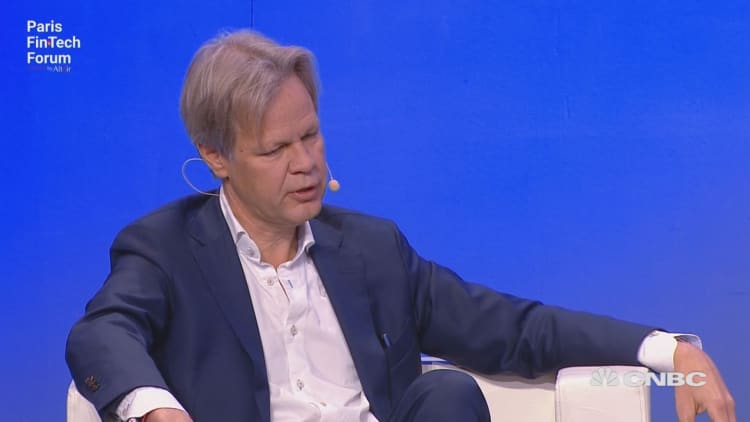Swift, the financial messaging service for the world's biggest banks, is partnering with blockchain start-up R3.
Gottfried Leibbrandt, Swift's chief executive, said the institution would link R3's platform with its new payments standards framework GPI, or Global Payments Innovation.
"We are announcing later today a proof-of-concept with the R3 blockchain on trade where you can initiate a payment on the trade platform and then it goes into GPI," Leibbrandt said at a CNBC-moderated panel session at the Paris Fintech Forum on Wednesday.
Founded in 2014, R3 leads a consortium of major financial institutions and is aimed at bridging the gap between blockchain technology and the banking industry.
The partnership with R3 will see Swift hook its GPI technology up to the former's blockchain platform Corda, according to an announcement on Swift's website. Firms using R3's Corda network will be able to authorize and settle payments with the help of a gateway called GPI Link, Swift said.
Swift touts GPI as a technology that's able to speed up cross-border payments between banks, with end-to-end tracking of transactions in real-time.
Leibbrandt was speaking beside Brad Garlinghouse, the chief executive of Ripple, a fierce competitor to R3. The San Francisco-based start-up has made no secret of its bid to steal business from the almost five-decades-old payments processing giant.

Garlinghouse said at the panel discussion that Ripple was open to "ways we could work with Swift," but neither company hinted at a partnership between the two in the near-term.
Swift is the irrefutable leader in cross-border payments, with more than 11,000 institutions using its platform. It moves an estimated $200 billion around the world every day.
But Swift's platform can be expensive and slow, sometimes taking days for payments to process. Ripple's Garlinghouse said the weakness of this model was that it's centralized, versus a blockchain model that stresses decentralization.
"Decentralized systems I think over time are likely to win," Garlinghouse said. "I think that today that is not what Swift is."
Advocates of blockchain tech often point to its lack of a central authority as a key benefit when it comes to transferring funds quickly across borders. Blockchain networks are distributed across a network of computers rather than one central location.
"Swift today is a one-way messaging framework, it isn't a liquidity provider," Garlinghouse added. "When we think about an internet of value, it's a mixture of two-way messaging frameworks — moving to a real-time chatting protocol if you will — coupled with real-time liquidity."
Ripple has made waves in the payments industry in recent years, signing on customers like Spanish bank Banco Santander to its xCurrent messaging system. The system uses technology similar to blockchain to transfer funds between customers within seconds.
At the core of the debate between Ripple and Swift is the role of blockchain. Ripple's system relies on the technology to execute payments, allowing banks to communicate in real-time via secure messages.
Swift has been much more hesitant to embrace blockchain. The company rolled out GPI in 2017 to speed up payment-processing times, increase transparency and lower costs, but it mainly relied on existing infrastructure and cloud technology.
Swift's reluctance about blockchain is amplified by concerns over the volatile swings seen in cryptocurrencies, Leibbrandt said. Bitcoin, the world's best known cryptocurrency, climbed to a record high near $20,000 towards the end of 2017, but has since plummeted to around $3,400.
"I think that the big part of Ripple's value proposition is the cryptocurrency XRP," Leibbrandt said. "There we do find the banks are hesitant to convert things into a cryptocurrency right now because of the volatility in the currencies."
Ripple owns 60 percent of XRP and sells the asset to fund its business. Garlinghouse said that worries over volatility in cryptocurrencies were unfounded.
"I hear people talk about volatility and I feel like they're propagating this misinformation," he said. "Mathematically, there's less volatility risk in an XRP transaction than there is in a fiat transaction."
Liebbrandt, who has been CEO of the Brussels-based consortium since 2012, announced last year he will step down in June.

Clarification: This story has been updated to more accurately describe how Swift is linking R3's platform with its new payments standards framework GPI.



